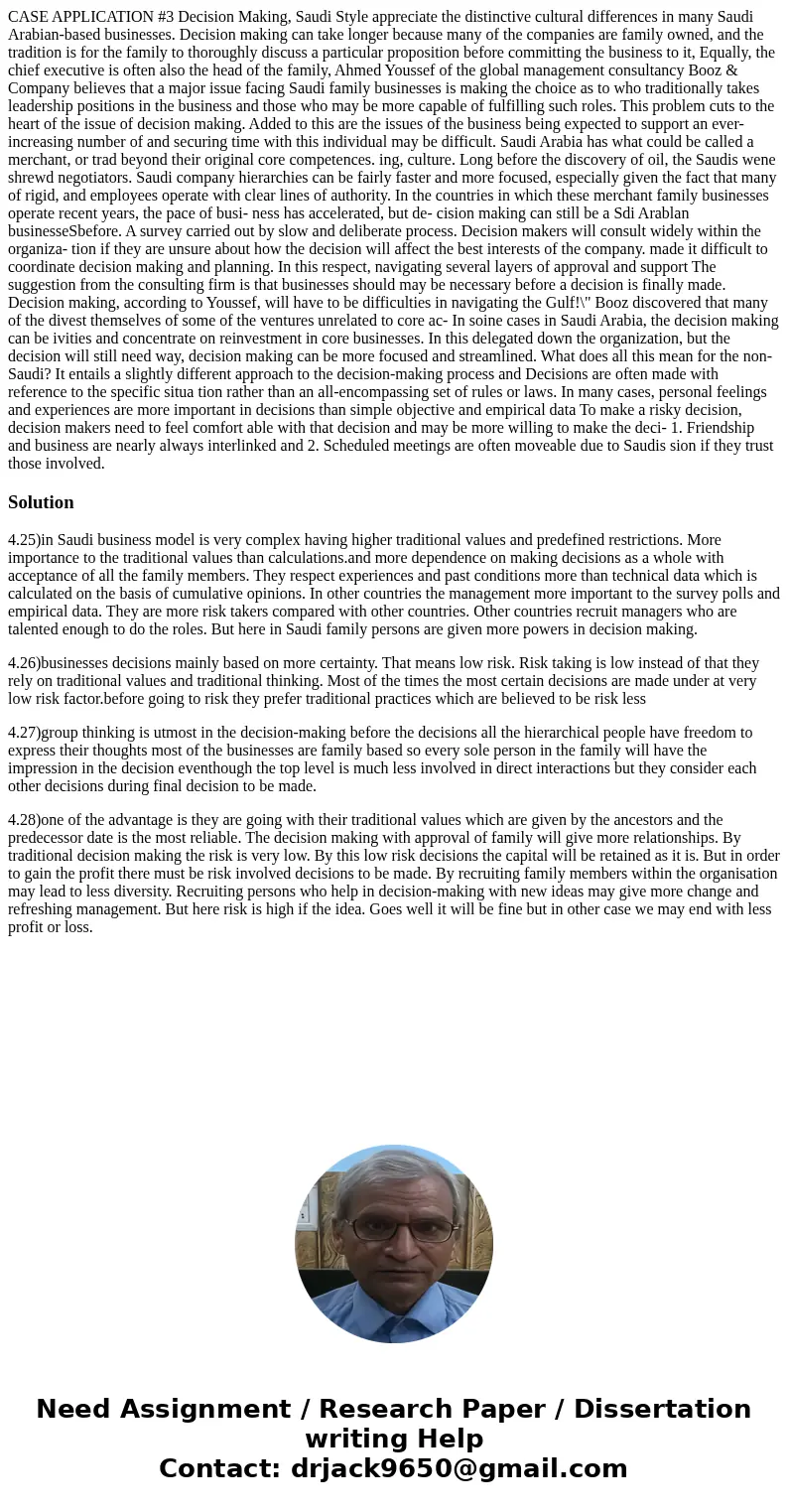CASE APPLICATION #3 Decision Making, Saudi Style appreciate the distinctive cultural differences in many Saudi Arabian-based businesses. Decision making can take longer because many of the companies are family owned, and the tradition is for the family to thoroughly discuss a particular proposition before committing the business to it, Equally, the chief executive is often also the head of the family, Ahmed Youssef of the global management consultancy Booz & Company believes that a major issue facing Saudi family businesses is making the choice as to who traditionally takes leadership positions in the business and those who may be more capable of fulfilling such roles. This problem cuts to the heart of the issue of decision making. Added to this are the issues of the business being expected to support an ever-increasing number of and securing time with this individual may be difficult. Saudi Arabia has what could be called a merchant, or trad beyond their original core competences. ing, culture. Long before the discovery of oil, the Saudis wene shrewd negotiators. Saudi company hierarchies can be fairly faster and more focused, especially given the fact that many of rigid, and employees operate with clear lines of authority. In the countries in which these merchant family businesses operate recent years, the pace of busi- ness has accelerated, but de- cision making can still be a Sdi Arablan businesseSbefore. A survey carried out by slow and deliberate process. Decision makers will consult widely within the organiza- tion if they are unsure about how the decision will affect the best interests of the company. made it difficult to coordinate decision making and planning. In this respect, navigating several layers of approval and support The suggestion from the consulting firm is that businesses should may be necessary before a decision is finally made. Decision making, according to Youssef, will have to be difficulties in navigating the Gulf!\" Booz discovered that many of the divest themselves of some of the ventures unrelated to core ac- In soine cases in Saudi Arabia, the decision making can be ivities and concentrate on reinvestment in core businesses. In this delegated down the organization, but the decision will still need way, decision making can be more focused and streamlined. What does all this mean for the non-Saudi? It entails a slightly different approach to the decision-making process and Decisions are often made with reference to the specific situa tion rather than an all-encompassing set of rules or laws. In many cases, personal feelings and experiences are more important in decisions than simple objective and empirical data To make a risky decision, decision makers need to feel comfort able with that decision and may be more willing to make the deci- 1. Friendship and business are nearly always interlinked and 2. Scheduled meetings are often moveable due to Saudis sion if they trust those involved.
4.25)in Saudi business model is very complex having higher traditional values and predefined restrictions. More importance to the traditional values than calculations.and more dependence on making decisions as a whole with acceptance of all the family members. They respect experiences and past conditions more than technical data which is calculated on the basis of cumulative opinions. In other countries the management more important to the survey polls and empirical data. They are more risk takers compared with other countries. Other countries recruit managers who are talented enough to do the roles. But here in Saudi family persons are given more powers in decision making.
4.26)businesses decisions mainly based on more certainty. That means low risk. Risk taking is low instead of that they rely on traditional values and traditional thinking. Most of the times the most certain decisions are made under at very low risk factor.before going to risk they prefer traditional practices which are believed to be risk less
4.27)group thinking is utmost in the decision-making before the decisions all the hierarchical people have freedom to express their thoughts most of the businesses are family based so every sole person in the family will have the impression in the decision eventhough the top level is much less involved in direct interactions but they consider each other decisions during final decision to be made.
4.28)one of the advantage is they are going with their traditional values which are given by the ancestors and the predecessor date is the most reliable. The decision making with approval of family will give more relationships. By traditional decision making the risk is very low. By this low risk decisions the capital will be retained as it is. But in order to gain the profit there must be risk involved decisions to be made. By recruiting family members within the organisation may lead to less diversity. Recruiting persons who help in decision-making with new ideas may give more change and refreshing management. But here risk is high if the idea. Goes well it will be fine but in other case we may end with less profit or loss.

 Homework Sourse
Homework Sourse